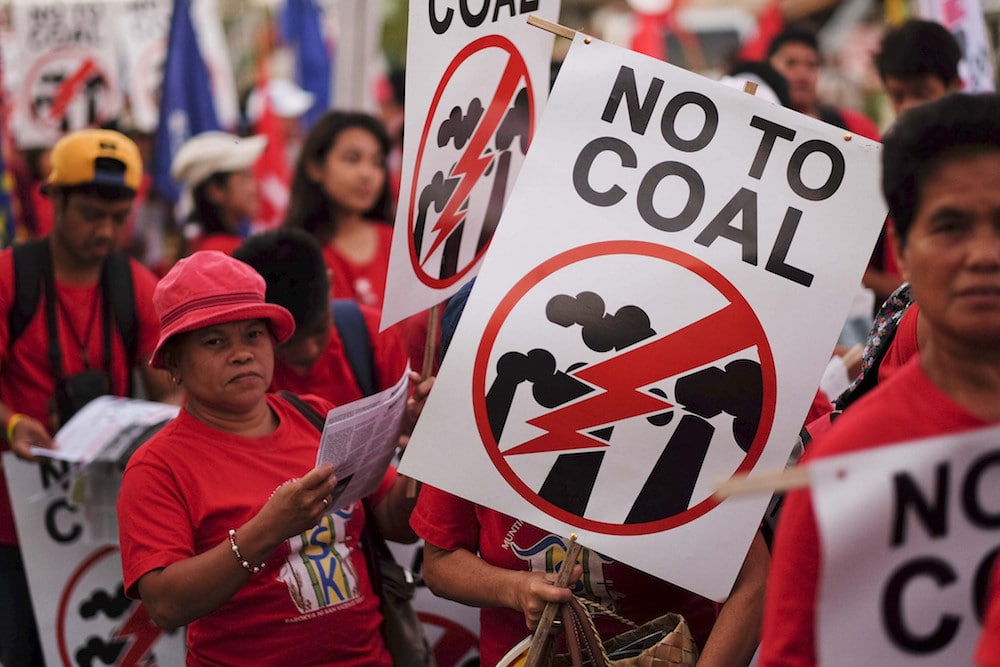On September 21, 31 countries, including Brazil and Mexico, ratified the Paris climate agreement at a United Nations event in New York City. They joined the U.S., China, and 27 other nations which had previously committed to the agreement, bringing the total to 60 and surpassing the first of two thresholds, requiring 55 nations to ratify it. In addition, their combined greenhouse gas emissions represent 47.76 percent of the needed 55 percent of global emissions for the agreement to enter into force.
But, practically speaking, what did the now 60 countries actually agree to when they said they would limit warming to “well below 2°C” and strive for 1.5°C?
A new report from Oil Change International calculates that, in order to accomplish those goals, governments need to stop permitting and building all new fossil fuel projects and retire early some existing oil and gas fields and coal mines.
Entitled “The Sky’s Limit: Why the Paris Climate Goals Require a Managed Decline of Fossil Fuel Production,” the report says that just burning fossil fuels from projects presently in operation will produce enough greenhouse gas emissions to push the world well past 2°C of warming this century. Limiting warming to 1.5°C calls for even larger closures of existing operations.
“If the world is serious about achieving the goals agreed in Paris, governments have to stop the expansion of the fossil fuel industry,” Stephen Kretzmann, Executive Director of Oil Change International, said in a statement. “The industry has enough carbon in the pipeline — today — to break through the sky’s limit.”
The report’s findings call attention to the uncomfortable contradiction between the global climate goals set through the United Nations process and the reality of fossil fuel reserves that are being exploited.
This week’s event in New York is part of a larger push for nations to ratify the Paris agreement ahead of the next major UN climate summit in Marrakesh, Morocco, in November.
“The evidence is clear: to avoid catastrophic climate change, we need our political and financial leaders to stop any further fossil fuel development and start scaling back,” said Amanda Starbuck of Rainforest Action Network, whose organization endorsed the report.
The report’s authors point out several recommendations for aligning climate policy with these goals, first and foremost by moving away from investing in new fossil fuel infrastructure.
They reason that any new coal mine or oil field or natural gas pipeline would need to be shut down early to avoid emissions that would go beyond the agreed level of warming.
That would translate to no small amount of wasted money. The report argues that over the next 20 years investments in new fossil fuel extraction and transportation projects are forecasted to be about $14 trillion.
“Once an extraction operation is underway, it creates an incentive to continue so as to recoup investment and create profit, ensuring the product — the fossil fuels — are extracted and burned,” commented report author Greg Muttitt in a statement.
“These incentives are powerful, and the industry will do whatever it takes to protect their investments and keep drilling. This is how carbon gets ‘locked-in.’”
Indeed, the report begins with the words: “If you’re in a hole, stop digging.”
Yet even if, for example, the world completely stopped digging up and burning coal, the projected emissions from oil and gas fields already in production would warm the climate more than 1.5°C.
Not that such a halt in coal production would be insignificant, especially coming from the world’s major coal producers. Both China and Indonesia have announced a freeze on developing all new coal mines, while the United States has applied this only to federal lands.
Furthermore, citing Denmark, Germany, and Nicaragua as proofs-of-concept, the report concludes that scaling up renewable energy for electricity generation is feasible on the same timescale needed to move away from fossil fuels.
The report doesn’t pretend, however, that fossil fuel use will completely end or that the burden of responsibility for this “managed decline” of fossil fuels and “just transition” toward clean energy falls evenly among nations:
“Some fields and mines — primarily in rich countries — should be closed before fully exploiting their resources, and financial support should be provided for non-carbon development in poorer countries. Additionally, production should be discontinued wherever it violates the rights of local people — including indigenous peoples — or where it seriously damages biodiversity.”
In addition, the report says, governments will need to take the lead in retraining and supporting both the individual workers and communities currently relying on fossil fuels for jobs, which is a tall order.
Democratic presidential nominee Hillary Clinton has proposed a $30 billion plan to transition away from coal in the United States while “ensur[ing] that coal miners and their families get the benefits they’ve earned and respect they deserve.”
Politico quotes experts, including mining engineer and consultant Andy Roberts, on the feasibility and timeline (years-to-decades) of such a plan, in light of the dedicated cooperation and funding it would require from Congress.
“It would be unrealistic to believe that you could, overnight, transform an industry into something different,” Roberts told Politico.
This report builds on the work, dating back to the 1990s, of other scientists and environmental advocates, who have analyzed global greenhouse gas emissions as a finite “carbon budget.” Bill McKibben, founder of the climate action group 350.org, helped bring this work to light in his 2012 Rolling Stone article, “Global Warming’s Terrifying New Math.”
Jamie Henn of 350.org, another organization endorsing the report, commented on this latest analysis.
“This report takes the carbon math into the hot, dangerous present,” said Henn. It “arms activists with a clear set of facts that they can use to oppose new fossil fuel projects across the board. Any new pipeline, any new gas plant, all of these projects have become a frontline in the climate fight.”
Main image: Philippines joins global wave of actions to break free from fossil fuels. Credit: Veejay Villafranca/Institute for Climate and Sustainable Cities, CC BY–NC–SA 2.0
Subscribe to our newsletter
Stay up to date with DeSmog news and alerts







